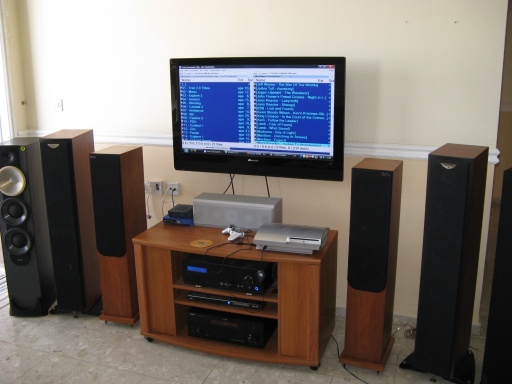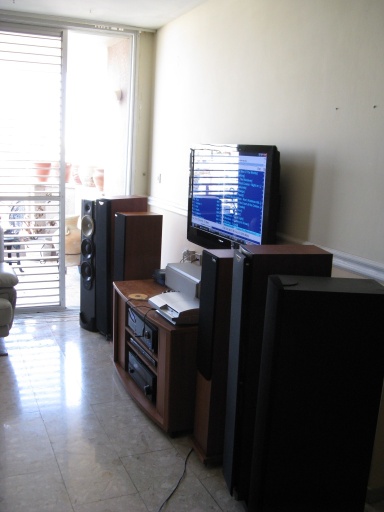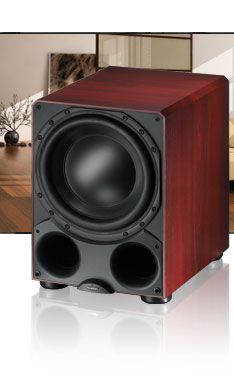Note: This is a translation of a forum post in an Israeli home theater site. If you're Hebrew-enabled, the ensuing thread might be of interest to you.
After a long period of running around, testing and making arrangements I've finally bought a new set of speakers for my home theater setup. I intend to describe the process, so if you're impatient feel free to scroll to the conclusion.
I've used the same set of CDs, same amplifier and same testing methodology for each system I was demonstrated:
- A Yamaha RX-V3800 A/V receiver, hooked up with HDMI where available and regular optical cable where it wasn't
- I started each demonstration with a consistent set of musical segments, with the receiver set to Pure Direct mode. Specifically:
- Telegraph Road (out of Love Over Gold by Dire Straits)
- Converting Vegetarians (out of the album by the same name)
- Elation Station (same album)
- Sharp switch to Creedence Clearwater Revival, with Lookin' Out My Backdoor
- Followed by Heard It Through the Grapevine by the same band
- Another sharp switch to Ear Parcel (out of Fear of Fours by Lamb. It's kind of "busy acid jazz" -- recommended for giving amplifiers a serious run for their money)
- And ending with Telegraph Road, again out of the Dire Straits album Love Over Gold
- In some cases I also played excerpts of Time and The Great Gig in the Sky by Pink Floyd
- I then proceeded to the home theater tests:
- Master and Commander: The Far Side of the World (the first naval warfare scene, as well as the scene where the captain and doctor play music together)
- I Am Legend on BluRay (Dolby TrueHD, mostly the chase scenes)
- Pan's Labyrinth on BluRay (DTS HD Master Audio, mostly dialogue-oriented scenes)
- Harry Potter and the Order of the Phoenix (several segments, the O.W.L test scene in particular)
- Gladiator (opening scene)
- After hearing all available options I've narrowed the selection down to three main (front) speakers and borrowed them for testing at home.
- The prices mentioned are from memory, in New Israeli Shekels and can be considered MSRP. In other words, you can usually get the same goods for a considerably lower price. Additionally, Israeli customs have a ~30% tax (VAT included) on loudspeakers, so prices here aren't really representative of the market price in the US.
The setups I've tested were:
Klipsch
This system is particularly characterized by a "large" sound-stage, and seems to be designed mostly for home theater use. Compared to most other systems I've listened to, the Klipsch speakers exhibit full and punchy sound in home theater, but which sounds slightly anemic when listening to music (the sound produced lacks volume - particularly noticeable with Dire Straits) and lacks resolution. The center, however, exhibited great potential in dialogues (Pan's Labyrinth in particular); the next center speaker high up in Klipsch's product offerings is the RC-64, which sounds even more impressive and is one of my candidates for purchase.
Bottom line: a good choice for those interested specifically in home theater, but Paradigm's more impressive offerings are available in the same price range in Israel.
Total cost: approximately 24,000 NIS.
Focal, Chorus series
- Front: Focal 816V
- Center: Focal 800CC
- No surround back
- No subwoofer
In a word: disappointing. I didn't even bother to continue with the home theater benchmarks. I had high hopes for this setup, both because of recommendations by several forum members in various conversations and because I have a Focal component set in my car and was pleasantly surprised by their performance in that market segment. With this setup, however, the result was a "dirty" sound that lacks proper resolution, is sharply biased towards low bass and over-bright treble. I consider this by far the weakest setup I have tested in my search.
Cost of the front speakers: about 8,000 NIS. Update: Forum members have pointed out that the actual price may be closer to 12,000 NIS.
Triangle, Esprit EX series
These speakers exhibit a very French sound, open and airy with terrific mid-bass and no shortage of punch in the low-end. The Antal were some of the most impressive speakers I've examined (in price as well as performance) and I ended up borrowing them for testing at home. The center speaker had terrific resolution and a very pleasant sound, despite the fact that the particular speaker tested was new and not yet broken in.
Cost of the front speakers: About 11,000 NIS.
ProAc
- Front: ProAc Studio 140
- Center: Focal Chorus 800CC
- Surround back: Focal Electra 1007 Be (I think)
- Subwoofer: B&W ASW608
I am not really partial to British loudspeakers in general, and ProAc in particular; I had previously listened extensively to both Tablette Signature and Response One models and had disliked their tonal character, which in my opinion is overly analytical and dry. This is why I entered this particular demonstration with rather low expectations, but the Studio 140 speakers simply blew me away from the get-go: they combine astonishing detail and resolution with huge sound-stage, and provide low, tight bass that's way out of their size league. At an MSRP of 15,900 NIS (actual price considerably lower) they are 30-40% more expensive than my other favorites.
The rear speakers also impressed me, particularly with the ambient effects in Master and Commander, but I think they are from a very highly priced series in Focal's line.
Paradigm, Monitor series
I'll admit that I came to this particular demonstration positively biased; I've known the old Monitor 9 v2 model for years and very much like the sound character of Paradigm's products. This system is one of the finest I've heard: the Monitors dealt incredibly well with just about any music I could throw at them and produce a deep, wide sound that I find very attractive. In the home theater benchmarks this setup absolutely shined: the Monitors themselves produce deep, penetrating bass and overall sound that is far tighter and more detailed than the Klipsch RF-82s. The center speaker is very convincing in dialogues, but lacks in the bass department, which is why I'm hoping to test the CC-390 and add it to my list of candidates for purchase. Regardless, I ended up borrowed the Monitor 11 pair for testing at home.
The subwoofer deserves a separate discussion which I get to further down the page.
Total cost: about 20,000 NIS, making this an amazing value for the money.
Paradigm, Studio series
Since the previous system left me some room in my budget I've allowed myself to test two of Paradigm's much-vaunted Studio series loudspeakers. The Studio 60 failed to impress me despite their impressive detail and resolution, this due to lacking mid-bass and low-end; I moved on quickly to comparing the Studio 100s directly with the Monitor 11. This model was far more to my liking: clarity and high resolution combined with tight, bunchy bass, but the sound still felt too thin and lacking in authority compared to the Monitor 11. To those of you looking for a highly detailed, analytical loudspeaker I definitely recommend giving the Studio 100 speakers a listen, but they just don't match my own preferences.
Cost of the Studio 100: roughly 16,000 NIS.
Finally I've heard several front and center speakers that I did not mention (certain Canton and Wharfedale models, for instance) because in my opinion they are not in the same league as those products. I will not bother expanding on those.

Eventually I've reached the dilemma of choosing between Triangle Antal EX (a beautiful loudspeaker with a deep, warm tonal character), Paradigm Monitor 11 (an impressive loudspeaker with serious presence, nor is it shy playing just stereo) and the considerably more expensive ProAc Studio 140. I was given all three pairs for testing at home during the Shavuot holiday, which gave me a relatively long time to spend with each speaker. I had four days to experience a variety of music, movies and TV series in a wide variety of genres, and have managed to reach several conclusions about these speakers:
- First and foremost it's worth noting that each and every pair sounded simply magnificent. I felt privileged to be able to simply switch from one pair to another and experience their magnificent respective sounds.
- I don't care what other people say, the Antal EX speaker is simply gorgeous.
- For all you married people: my SO actually preferred the looks of the Monitor 11.
- The Antal and Monitor speakers have similar character to their sound; where the Antal set was more detailed the Monitors compensated with glorious mid-bass, and where the Antals exhibited great low-end muscle the Monitors shined with excellent high-end resolution. If I had to pick between the two I'd be facing a bothersome dilemma, however...
- The Studio 140 set simply offers the best of all worlds and was the clear winner in my mind. Accurate and detailed yet exhibiting an amazingly wide sound-stage with deep, low, tight bass to boot? Not only that, the rich mid-bass and pleasant overall tone completely eradicated my expectations of dryness. They are indeed quite a bit more expensive, but I think they completely justify the price delta (5,000 NIS on paper, probably less in practice).

Bottom line: a pair of ProAc Studio 140 speakers will soon find its new home in my apartment.
As an unexpected bonus I was also provided the Paradigm DSP-3400 subwoofer for testing at home. When the sub was initially demonstrated for me at Stereo-Star, Rami (the sales person who was conducting the demonstration) walked in the room with a gargantuan cardboard box, and with a smile on his face told me "not to get excited, the sub is smaller than the box." Although technically true, the statement hadn't prepared me for just how amazingly big this subwoofer is -- a 14" woofer with two 6" ports underneath:

This subwoofer was my companion for the holidays and indirectly thought me a couple of tricks on how to reinforce cupboard hinges. I'm fairly a bass aficionado, particularly when it comes to home theater, and this little monster went above and beyond my expectations. After returning the demo model I went to a short demonstration of another subwoofer, the B&W ASW610, a little monster in its own right; the problem was that compared to the gut-wrenching effect produced when the DSP-3400 comes to life this was simply an underwhelming experience. Conclusion 1: I should sample equipment in order of ascending cost, not the other way around. Conclusion 2: I'm buying the DSP-3400. Its MSRP: about 7,500 NIS.
The demonstrations were held courtesy of Yaki of Z-Max, Rami Kasher of Stereo-Star, Zohar of Armageddon Audio and Eyal Por of Audio Fidelity. I heartily recommend to anyone looking for similar equipment to contact them.
And for those of you with me so far, here's a bonus kitty:
